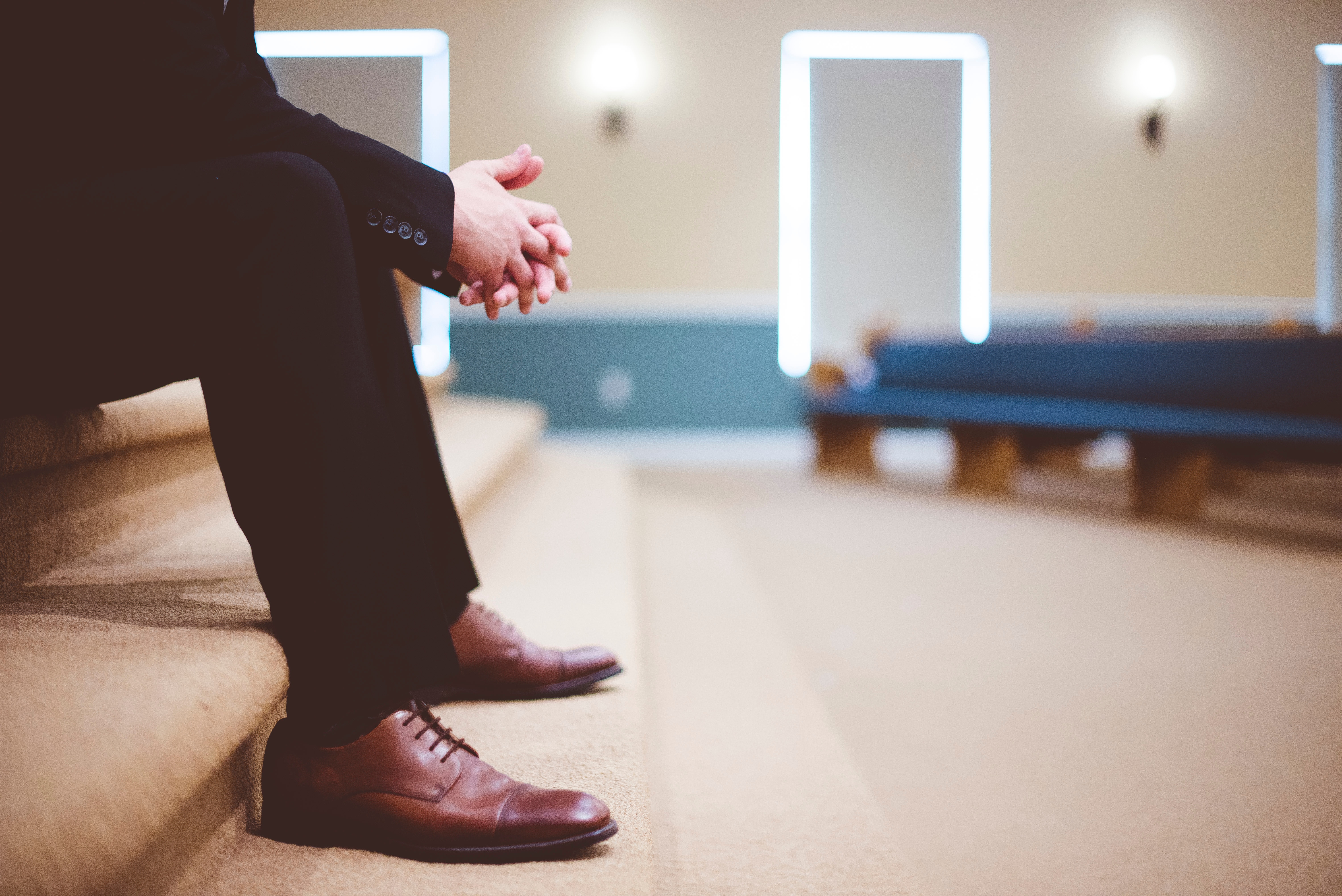The key to influencing men is influencing God.
In nothing should the leader be ahead of his followers more than in the realm of prayer. And yet the most advanced Christian is conscious of the possibility of endless development in his prayer life. Nor does he ever feel he has “already attained.” Dean C.J. Vaughan once said: “If I wished to humble anyone, I should question him about his prayers. I know nothing to compare with this topic for its sorrowful self-confessions.”
Prayer is the most ancient, most universal, most intense expression of the religious instinct. It touches infinite extremes, for it is at once the simplest form of speech that infant lips can try and the sublimes” strains that reach the Majesty on high. It is indeed the Christian’s vital breath and native air.
But, strange paradox, most of us are plagued with a subtle aversion to praying. We do not naturally delight in drawing near to God. We pay lip service to the delight and potency and value of prayer. We assert that it is an indispensable adjunct of mature spiritual life. We know that it is constantly enjoined and exemplified in the Scriptures. But in spite of all this, too often we fail to pray.
Let us take encouragement from the lives of men of like passions with ourselves who have conquered their natural reluctance and become mighty men of prayer.
The biographer of Samuel Chadwick wrote:
He was essentially a man of prayer. Every morning he would be astir shortly after six o’clock, and he kept a little room which was his private sanctum for his quiet hour before breakfast. He was mighty in public prayer because he was constant in private devotion…. When he prayed he expected God to do something. “I wish I had prayed more,” he wrote toward the end of his life, “even if I had worked less; and from the bottom of my heart I wish I had prayed better.” Norman G. Dunning, Samuel Chadwick (London: Hodder & Stoughton, 1934), p. 19.
“When I go to prayer,” confessed an eminent Christian, “I find my heart so loath to go to God, and when it is with Him, so loath to stay.” It is just at this point that self-discipline must be exercised. “When thou feelest most indisposed to pray, yield not to it,” he counseled, “but strive and endeavor to pray, even when thou thinkest thou canst not pray.”

Mastering the art of prayer, like any other art, will take time, and the amount of time we allocate to it will be the true measure of our conception of its importance. To most, crowding duties are a reason for curtailing time spent in prayer. To busy Martin Luther, extra work was a compelling argument for spending more time in prayer. Hear his answer to an inquiry about his plans for the next day’s work: “Work, work from early till late. In fact I have so much to do that I shall spend the first three hours in prayer.” If our view of the importance of prayer in any degree approximates that of Luther and Luther’s Lord, we will somehow make more time for it.
It is of course true that prayer poses intellectual problems. But those who are skeptical of its validity and efficacy are usually those who do not seriously put it to the test, or who fail to comply with the revealed conditions. There is no way to learn to pray except by praying. No reasoned philosophy by itself ever taught a soul to pray. But to the man who fulfills the conditions, the problems are met in the indisputable fact of answered prayer and the joy of conscious fellowship with God.
For the supreme example of a life of prayer, the leader will naturally turn to the life of the Lord Himself, since belief in the rationality and necessity of prayer is based not merely on logic but preeminently on His example and precept. If prayer could have been dispensed with in any life, surely it would have been that of the sinless Son of Man. If prayer was unnecessary or unreasonable, we would naturally expect it to be omitted from His life and teaching. On the contrary, it was the dominant feature of His life and a recurrent element in His teaching. An examination of its incidence reveals that prayer kept the vision of His moral duty sharp and clear. It was prayer that nerved Him to do and endure the perfect but costly will of His Father. Prayer paved the way for the Transfiguration. To Him, prayer was not a reluctant addendum, but a joyous necessity.
Both our Lord and His bondslave Paul made it clear that true prayer is not pleasant dreamy reverie.
“All vital praying makes a drain on a man’s vitality. True intercession is a sacrifice, a bleeding sacrifice,” wrote J.H. Jowett.
Jesus performed many mighty works without outward sign of strain, but of His praying it is recorded that “he offered up prayers and supplications with strong crying and tears” (Heb. 5:7, KJV).
How pale a reflection of Paul’s and Epaphras’s strivings and wrestlings are our pallid and languid intercessions! “Epaphras … is always wrestling for you in his prayers,” wrote Paul to the believers at Colossae (Heb. 4:12, MLB). And to the same group, “I would that ye knew what great conflict I have for you” (Heb. 2:1, KJV). The word for wrestling, conflict, is that from which our agonize is derived. It is used of a man toiling at his work until utterly weary (Col. 1:29); or competing in the arena for the coveted prize (1 Cor. 9:25). It describes the soldier battling for his life (1 Tim. 6:12); or a man struggling to deliver his friend from danger (Jn. 18:36). From these and other considerations it is clear that true praying is a strenuous spiritual exercise which demands the utmost mental discipline and concentration.
THE HOLY SPIRIT KEY TO PRAYER
It is encouraging to recall that Paul, probably the greatest human exponent and example of the exercise of prayer, confessed, “We do not even know how we ought to pray.” But he hastened to add, “The Spirit comes to the aid of our weakness … but through our inarticulate groans the Spirit himself is pleading for us, and God who searches our inmost being knows what the Spirit means, because he pleads for God’s people in God’s own way” (Ro. 8:26–28, NEB). The Spirit links Himself with us in our praying and pours His supplications into our own.
We may master the technique of prayer and understand its philosophy; we may have unlimited confidence in the veracity and validity of the promises concerning prayer. We may plead them earnestly. But if we ignore the part played by the Holy Spirit, we have failed to use the master key.

Progressive teaching in the art of praying is needed, and the Holy Spirit is the master Teacher. His assistance in prayer is more frequently mentioned in Scripture than any of His other offices. All true praying stems from His activity in the soul. Both Paul and Jude teach that effective prayer is “praying in the Spirit.” The phrase has been interpreted as praying along the same lines, about the same things, in the same name, as the Holy Spirit. True prayer rises in the spirit of the Christian from the Spirit who indwells him.
“Praying in the Spirit” may have a dual significance. It may mean praying in the realm of the Spirit, for the Holy Spirit is the sphere and atmosphere of the Christian’s life. But in fact, many of our prayers are psychical rather than spiritual. They move in the realm of the mind alone, the product of our own thinking and not of the Spirit’s teaching. But this is something deeper. The type of praying envisaged in this phrase “utilizes the body, demands the cooperation of the mind, but moves in the supernatural realm of the Spirit.” This kind of prayer transacts its business in the heavenly realm.
But the phrase “praying in the Spirit” may also mean praying in the power and energy of the Spirit. “Give yourselves wholly to prayer and entreaty; pray on every occasion in the power of the Spirit,” is the New English Bible rendering of Eph. 6:18. For its superhuman task, prayer demands more than mere human power, and this is supplied by the Holy Spirit. He is the Spirit of power as well as the Spirit of prayer. Human energy of heart and mind and will can achieve only human results, but praying in the Holy Spirit releases supernatural resources.
THE SPIRIT AS ALLY
It is the Spirit’s delight to aid the man entrusted with spiritual leadership in his moral and physical weakness in this matter of prayer, for the praying soul labors under three handicaps. But in each of them he may count upon the Spirit’s assistance. Sometimes he is kept from prayer by the conscious iniquity of his heart. As he trusts Him, the Holy Spirit will lead him to and enable him to appropriate the cleansing of that mighty solvent, the blood of Christ. Then the spiritual leader is hampered by the ignorance of his mind. The Spirit who knows the mind of God will share that knowledge with him as he receptively waits on Him. He does this by imparting a clear conviction that a petition is or is not according to the will of God. Again, the spiritual leader will often be earthbound through the benumbing infirmity of his body. The Spirit will quicken his mortal body in response to his faith, and will enable him to rise above adverse physical conditions.
In addition to these personal handicaps, the praying man has to overcome the subtle opposition of Satan who will seek to oppress or depress, to create doubt or discouragement. In the Holy Spirit the praying man has been given a heavenly ally against a supernatural adversary.
DISARMING THE ADVERSARY
The foregoing thoughts are doubtless not new to many who have read them, but is the mighty assistance, the power, of the Spirit in prayer a present and enjoyed experience? Have we slipped into an unintentional independence of the Spirit in prayer? Are we habitually “praying in the Spirit” and receiving the full answer to our prayers? It is very easy for our intellectual apprehension of spiritual truths to outrun our practical experience of their reality and power.
Prayer is frequently represented in Scripture under the figure of spiritual warfare. “We wrestle … against principalities, against powers, against the rulers of the darkness of this world, against spiritual wickedness in high places” (Eph. 6:12, KJV). In this phase of the prayer life, three personalities are involved, not two. Between God on the one hand and the Devil on the other, stands the praying man. Though weak in himself, he occupies a strategic role in the deathless struggle between the dragon and the Lamb. The power and authority he wields are not inherent but are delegated to him by the victorious Christ to whom he is united by faith. His faith is the reticulating system through which the victory gained on Calvary over Satan and his hosts reaches the captives and delivers them.

Throughout the gospels, the thoughtful reader will discern that Jesus was concerned not so much with the wicked men and the evil conditions He confronted as with the forces of evil at the back of them. Behind well-meaning and ever-vocal Peter, behind the traitorous Judas, Jesus saw the black hand of Satan. “Get thee behind me Satan,” was the Lord’s response to Peter’s well-intentioned but presumptuous rebuke. We see men around us bound in sin, and in captivity of the Devil, but our concern in prayer should be not only to pray for them but to pray against Satan who holds them captive. He must be compelled to relax his grip on them and this can be achieved only by Christ’s victory on the Cross. Jesus dealt with the cause rather than the effect, and the leader should adopt the same method in this aspect of his praying. And he must know how to lead those under him to victory in this spiritual warfare.
In a graphic illustration, Jesus likened Satan to a strong man, fully armed, who kept his palace and goods in peace. Before he could be dispossessed and his captives released, Jesus said he must first be bound, or rendered powerless. Only then could the rescue be effected (Mt. 12:28–29). What does it mean to “bind the strong man,” if not to neutralize his power by drawing on the conquering power of Christ who was manifested “to destroy [nullify, render inoperative] the works of the devil”? And how can this be done but by the prayer of faith which lays hold on the victory of Calvary and believes for its repetition in the specific context of the prayer? We must not make the mistake of reversing our Lord’s order, and expect to effect the rescue without first disarming the adversary. The divinely delegated authority placed in our hands may be confidently exercised, for did not our Lord say to His weak disciples, “Behold, I have given you authority … over all the power of the enemy” (Lk. 10:19, RSV)?
MOVING PEOPLE THROUGH PRAYER
Since leadership is the ability to move and influence people, the spiritual leader will be alert to discover the most effective way of doing this. One of the most frequently quoted of Hudson Taylor’s statements is his expression of conviction that “it is possible to move men, through God, by prayer alone.” In the course of his missionary career he demonstrated its truth a thousand times. However, it is one thing to give mental assent to his motto, but quite another thing consistently to put it into practice. Men are difficult objects to move, and it is much easier to pray for temporal needs than for situations which involve the intricacies and stubbornness of the human heart. But it is in just such situations that the leader must prove his power to move human hearts in the direction in which he believes the will of God lies.
In prayer, we deal directly with God, and only in a secondary sense with men and women. The goal of prayer is the ear of God. Prayer influences men by influencing God to influence them. It is not the prayer that moves men, but the God to whom we pray.
Prayer moves the arm
That moves the world
To bring deliverance down.
To move men, the leader must be able I to move God, for He has made it clear that He moves them through the prayers of the intercessor. If a scheming Jacob could be given “power with God and with men,” then is it not possible for any leader who is willing to comply with the conditions to enjoy the same power (Gen. 32:8)?
Prevailing prayer of this kind is the outcome of a correct relationship with God. Reasons for unanswered prayer are stated with great clarity in Scripture, and they all center around the believer’s relationship with God. He will not be party to petitions of mere self-interest, nor will He countenance impurity of motive. Sin clung to and cherished will effectively close His ear. Least of all will He tolerate unbelief, the mother of sins. “He that cometh to God must believe.”
Everywhere in prayer there is the condition, either expressed or implied, that the paramount motive in praying is the glory of God.
The eminence of great leaders of the Bible is attributable to the fact that they were great in their praying.
They were not leaders because of brilliancy of thought, because they were exhaustless in resources, because of their magnificent culture or native endowment, but because by the power of prayer, they could command the power of God.
This article by Oswald Sanders was first published in issue 41 of the Discipleship Journal. Oswald served as director of Overseas Missionary Fellowship and led a worldwide teaching ministry. He was the author of more than 30 books. This article is adapted from Spiritual Leadership, Copyright 1967, 1980, Moody Bible Institute of Chicago, Moody Press. Used by permission.

